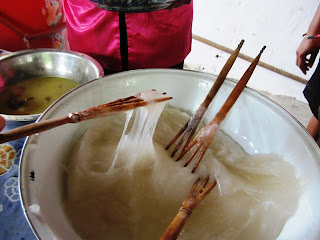I'll begin with an apology. I had great intentions of posting about my first village experience, but I realized before I tried to explain in words how I felt to you, I needed to understand first. It was during this processing stage that our internet went on the fritz (not uncommon here), so I was unable to post my first update. I guess I still needed more time! :)
Bias (pronounced Bee-Ahs) is about a 45 minute flight over the jungles, mountains, and rugged terrain of Papua. It's nestled right along side the Papua New Guinian boarder. It's south of the Star Mountains, and is in a bowl. So it's hot and humid all the time! Our dear friends Chase and Kelli serve there. They were mentioned in a previous newsletter under a section called "Connecting the Dots-Translation focus." We are involved in a small group Bible study with them and another sweet family who recently moved back to America. We also arrived in Indonesia within six months of each other, and Josh and I were involved a tiny bit in their initial orientation. So, I guess what I'm saying is, we've been on this journey together for a while now. Josh has gone out before to help lay the foundation for their new home. Selfishly, I didn't want to be left out of those conversations that will come in the future that begin with the "Do you remember what it was like in that first house we lived in?" There's the background- now my story and thoughts.
This blog is a place of honesty and transparency for me, plus I'm going to say those things that everyone might be thinking! I've been in Indonesia now for almost four years. My total experience with people that live in interior villages can be summed up in a ride along on a Yajasi flight. We landed, off loaded the stuff, and took off. That's it! There was the occasional photo taken, and just enough time to realize," Wow, I'm different."
I knew I would have no problems on a day flight, mainly because I would be returning to the comfortable life I live in town. A nice warm meal- at home or take out; my cozy bed; cable tv; internet; and oh yeah, air conditioning! It was the overnighting for a few consecutive nights that I kept thinking about.
Here were some of my [personal but you would think them too] thoughts: Main thought was the bathroom situation. Every single place I have ever been to has a different bathroom set up. Toilet- Western or Squatty? (For more info on a squatty see here-
http://en.wikipedia.org/wiki/Squat_toilet or google "squat toilet" and look at some interesting posts or videos on more specific details that I have not screened) yes, not everyone in the world uses the bathroom like you. It might be worth researching if you're going to an Asian country- just to be safe!
Lower on the list of concerns was bathing. This was lower, because it's the village! We're only going to be there for a few days, so we'll test the level of relationship here and go a few days without showering.
Sleeping- ok, ummmm, where are we going to be? I had heard stories of GIANT spiders (eeeeek!), BIG rats (eeeeeek!), and FAT roaches (ew.) So, I'm so busy focused on the other "issues" that I had really thought about those things! Oh and mosquitos getting inside your tent and bitting your face all night long (that'll cause a nightmare!) Josh just said,"Amber, it's just like camping." Camping for me growing up was an RV that was pulled by our car and was surrounded by a swimming pool and grill pits. Catch what I'm saying here? I have not done much "camping". On furlough we "camped" at a campground with tents, a campfire, sleeping bags, all next to a major road. :) So we were still in the midst of city.
Eating/Cooking- I wasn't worried about this one bit! We have heard that our friends eat better in the village than they do at home. :)
My last thought was the welcome. I know that sounds strange, but they didn't know we were coming. We hadn't been able to communicate with them. So we didn't know where they were on their food planning (we brought some meals), were they tired of people coming to visit?? We didn't know if they even wanted us there!
We packed our bags, cooked our meals, and prayed that God would work out the weather and the flights for us to get there.
 |
| At Yajasi weighing in our stuff |
 |
| Ready to go! (Jackets were due to rain not being cold!) |
 |
| Our pilot- Jefron |
 |
| Getting settled in my seat and a reminder of how to buckle up |
 |
| Thumbs up! We're going to Bias! |
 |
| Bias from above. The house farthest south is the new home. |
 |
| 18 year old mission house- we set up camp inside. |
 |
| sleeping in a tent with the world renown "lil' g quilt". |
 |
| The main drag- a community development project added the rocks, lights, and ditches. |
 |
| The path through the jungle to the river. |
 |
| The most refreshing place in all of Bias- the river. :) |
There's way more to come about what we did and who we met on our adventure to Bias. I just thought that I would fill you in on my feelings, hesitations, fears, worries, questions, and more about going interior. Definately more to come!









































